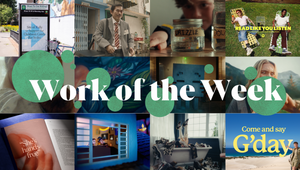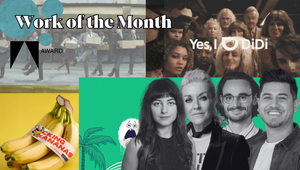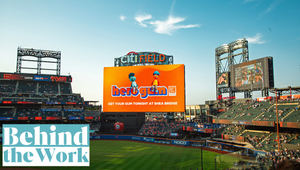
Unilever’s Aline Santos on Unstereotyping Influencers and Urging the Public to Speak Out

With divisiveness and anger continuing to rage online, infiltrating society and politics, Aline Santos, chief brand officer and chief equity diversity and inclusion officer at Unilever, reckons that fighting stereotypes is more crucial than ever. And that’s an insight backed up by new research from Unilever’s ‘Act 2 Unstereotype’ initiative. The survey of 3,300 gen z folk across the UK, US and Brazil found that three quarters feel the world is increasingly divided (73%) and over half feeling it is less tolerant and inclusive (51%) - and that 93% of gen z have seen stereotypes on social media and regularly come across stereotypes in influencer content relating to women (61%), body image (57%), the LGBTQI+ community (54%) and ethnicity (52%).
Those insights have catalysed two important new initiatives. Unilever’s ‘Act 2 Unstereotype’ has created a new guide to proactively help influencers to unstereotype the brand content they put out. And the cross-industry Unstereotype Alliance, which has historically focused on challenging stereotypes in the context of the marketing and advertising created by brands and agencies, is now bringing the conversation to the general public. A new campaign created by Ogilvy and produced by IPG’s Craft demonstrates that unstereotyping is all of our responsibility.
Aline shares some insight behind how the project came about and how the industry can ‘unstereotype’ itself.
LBB> What inspired you and your team to investigate how prevalent stereotypes are on social media specifically?
Aline> In 2016, Unilever launched the ‘Unstereotype’ initiative with a focus on removing stereotypes from our advertising. In 2020, we took the next step in our journey with ‘Act 2 Unstereotype’. With this, we took a more forensic approach to ensuring equity, diversity and inclusion is embedded at every stage of our end-to-end marketing process - both on screen and behind the camera. This year, given the growing impact and influence of social media, particularly on gen z consumers, we felt the next step was to help ‘Unstereotype’ branded influencer content. We believe unstereotypical branded influencer content, that is authentic, has the power to drive inclusivity and equity for underserved communities on social media.
LBB> The results were really shocking , not just in terms of the proportions of people who had seen stereotypes but the emotional impact of those stereotypes - how surprising were those findings?
Aline> It is worrying to see such a significant proportion of gen z consumers feeling frustration (57%), anxiety (55%), sadness (55%) and anger (52%) when using social media, and it’s particularly concerning that these feelings are often heightened among the LGBTQIA+ and disabled communities. As marketers, we have a responsibility to ensure we are not contributing to this through our branded influencer content.
Whilst social media is a great source of connection, community and inspiration for consumers, it is also where harmful and outdated stereotypes can be prevalent and easily perpetuated. So, whilst it is worrying, we weren’t necessarily surprised by the research results, and it really highlighted the need to inspire change among influencers and brands collectively. This led to us producing the ‘10 Ways to Unstereotype Influencer Brand Content’ guide, in collaboration with influencers. The ‘10 Ways’ provide guidance for influencers on how to produce responsible branded content that does not perpetuate stereotypes.
LBB> I guess the trickiness of eradicating stereotypes in content from influencers is that they often operate under a degree of autonomy, so what's the key to tackling that?
Aline> We carefully assess all the influencers we work with to ensure that they are aligned with our values as a business and, therefore, our mission to unstereotype influencer brand content. Our ‘10 Ways to Unstereotype Influencer Brand Content’ guide’ will enable influencers to maintain their autonomy and creative freedom, while providing them with useful prompts and considerations to help produce work that is free from stereotypes. We believe it will be a valuable tool to help influencers create content that is more inclusive and authentic to themselves and the world we live in.
LBB> While some might deliberately perpetuate stereotypes, others do so more unknowingly - what role does education play?
Aline> Unstereotyping branded influencer content is a long-term ambition, and education is going to be absolutely key to achieving it. While nobody can promise to get things right 100% of the time, we want to work in collaboration with our influencer partners, listening and learning from each other, to ensure we’re all creating responsible branded content.
We have open-sourced our ‘10 Ways’ guide so that everyone, even beyond our contracted influencers, has access to the guidance to help create and produce content that is free from harmful stereotypes.
LBB> There's also a new campaign, unveiled at the IPG Inclusion Breakfast at Cannes, which is the first consumer-facing campaign from the Unstereotype Alliance - why was now the right time to go to the general public with the message?
Aline> Recent research, conducted by the Unstereotype Alliance revealed that 63% of people believe stereotyping has become a bigger problem in recent years. In light of this, the Unstereotype Alliance felt there couldn’t be a better time to launch the campaign ‘Say Nothing, Change Nothing’. The issue is clear - we are still seeing and experiencing stereotypes everyday — stereotypes that put some of the world’s brightest, most brilliant people in a box, slowing down progress towards a more equitable world.
This is the first consumer-facing campaign ever run by the Unstereotype Alliance, but it has received phenomenal global support, in particular from actor, playwright, activist for women’s rights and UN Women Goodwill Ambassador, Danai Gurira. With Danai spearheading the campaign, we hope it will encourage conversation on the issue and ignite a public movement.
LBB> The campaign really holds up a mirror to our silence - why was it important to approach the campaign in that way?
Aline> Unilever co-piloted the ‘Say Nothing, Change Nothing’ campaign with the Unstereotype Alliance to mobilise public action against stereotypes and the pervasive role they play in society. Stereotypes create a silent epidemic, and it’s one that affects us all.
By highlighting it’s everyone's responsibility to speak up to stop the perpetuating cycle of stereotypes, we hope we’ll create a shift in behaviour and, ultimately, start a movement against stereotyping. We also produced the ‘Unstereotype 101’ guide as a practical tool to help silent bystanders to learn how to safely move to becoming an upstander.
The sooner people start to adjust their behaviour from being ‘bystanders’ to being ‘upstanders’ in a stereotyping situation, the better! When we join forces together, peoples’ voices can make a monumental difference in breaking down and eradicating stereotypes.
LBB> At the IPG Inclusion Breakfast in Cannes, you said that that stereotypes are at the very core of all of the division and polarisation we're seeing in the world. That seems to be getting worse thanks to the culture war dynamics playing out in society and on social media. So I was wondering if you can expand on that and the damage that you see stereotypes wreaking more broadly?
Aline> Our research found that exposure to stereotypes on social media is making three quarters of gen z consumers feel the world is increasingly divided (73%) and over half believe it is less tolerant and inclusive (51%). An additional two thirds (64%) feel the online space is unsafe due to the prevalence of stereotypes on social platforms. These figures are hugely concerning so it’s crucial that we act now to play our part in eradicating stereotypes from branded influencer content and help create a safer space for all online.















